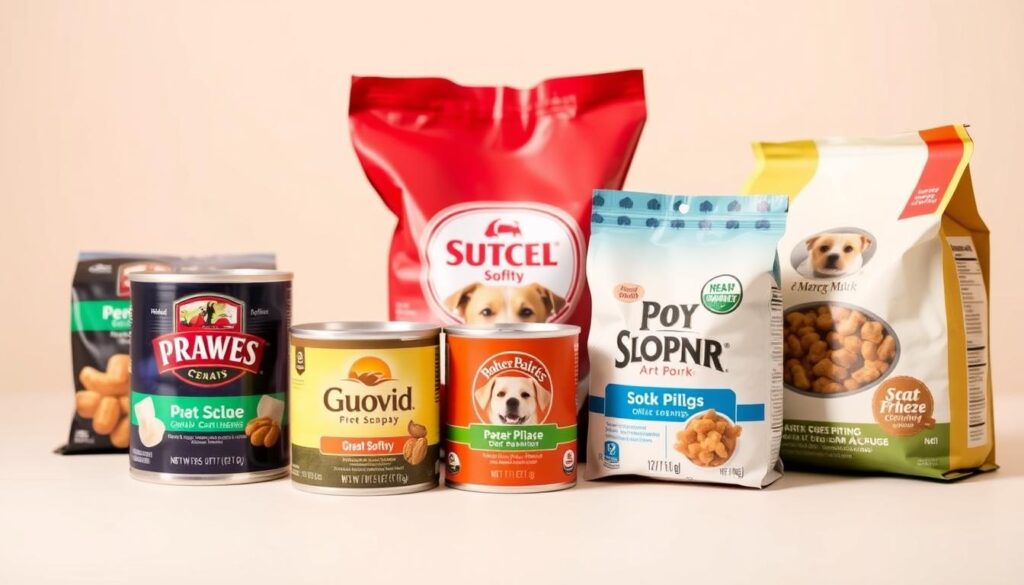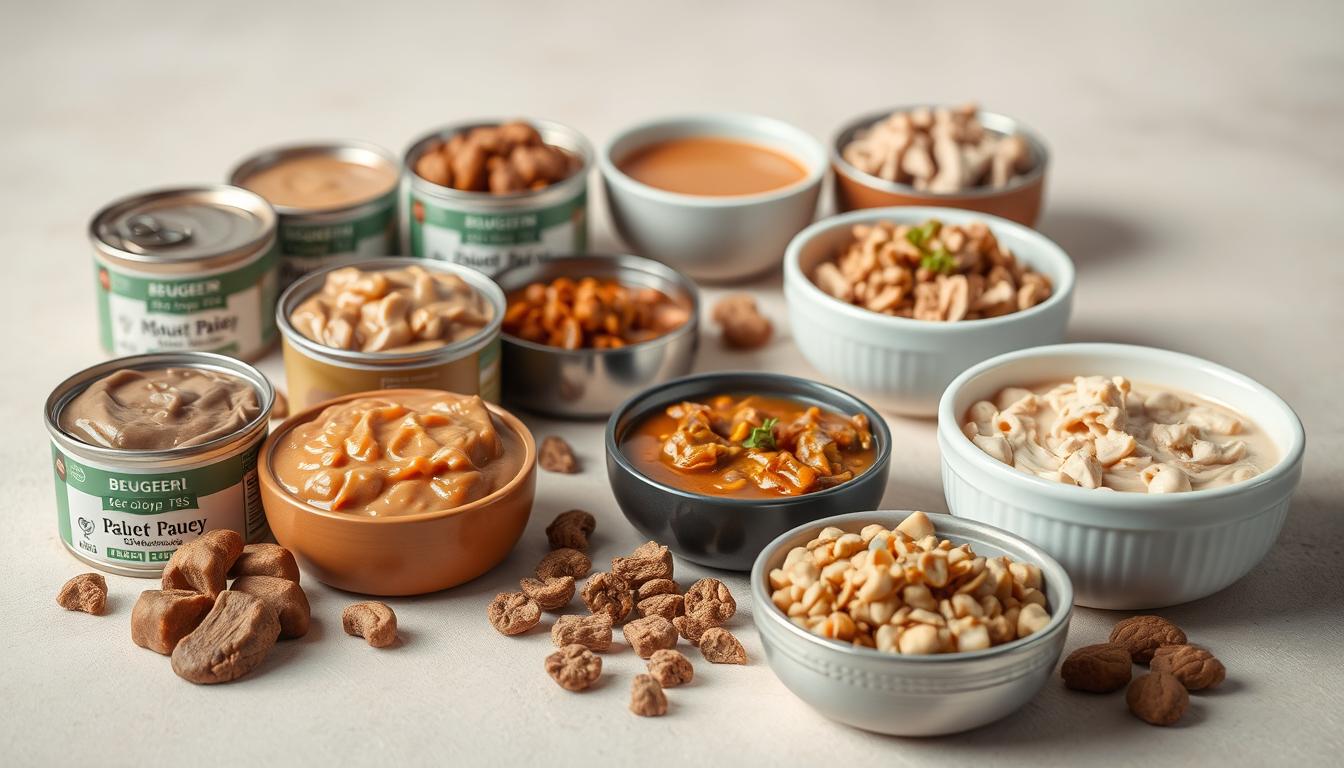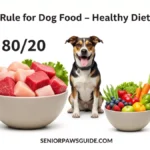As dogs get older, their food needs change. Best Soft Foods for Senior Dogs, Digestive health becomes a concern. Senior dogs often face challenges with regular dog food. This is due to dental problems, decreased appetite, or trouble chewing.
Nourishing older dogs requires a thoughtful approach to their diet. Soft foods are great because they’re easy to chew and digest. The right soft food can help your senior dog stay healthy and happy.
Table of Contents
Key Takeaways
- Senior dogs require special dietary considerations due to age-related health issues.
- Soft foods can be an excellent option for older dogs with dental problems or difficulty chewing.
- The right nutrition is key for keeping senior dogs healthy and well.
- Soft foods can help ease age-related health issues in older dogs.
- A thoughtful diet is vital for nourishing older dogs.
Why Senior Dogs Need Special Diets
Senior dogs need special diets because of the changes they go through as they age. These changes affect their health and what they need to eat.
Age-Related Changes in Canine Digestion
As dogs get older, their digestion changes. This can make it harder for them to absorb nutrients and can make some foods hard to digest.
Dental Issues and Chewing Difficulties
Senior dogs often have dental problems like tooth loss and gum disease. This makes it hard for them to chew their food. Soft foods can be very helpful in these cases.
Decreased Appetite and Sensory Changes
Senior dogs may eat less and have changes in their sense of smell and taste. This can make eating hard. Palatable, nutrient-rich soft foods can help make mealtime more appealing.
Here’s a comparison of the nutritional needs of senior dogs versus younger dogs:
| Nutritional Aspect | Younger Dogs | Senior Dogs |
|---|---|---|
| Protein Requirements | Moderate to High | Moderate, with a focus on easy-to-digest sources |
| Calorie Needs | Higher due to activity levels | Lower, as activity levels decrease |
| Digestive Health | Generally robust | More sensitive, requiring easier-to-digest foods |
Nutritional Requirements for Senior Dogs
Senior dogs need special nutrition to stay healthy and happy. As they get older, their bodies change. This means their diet must change too.
Optimal Protein Levels for Muscle Maintenance
Senior dogs need the right amount of protein to keep their muscles strong. High-quality protein sources like chicken, fish, or lamb are best.
Essential Fatty Acids for Joint and Cognitive Health
Essential fatty acids, like omega-3 and omega-6, are key. They help keep joints healthy and support the brain.
Reduced Calorie Needs and Weight Management
Senior dogs need fewer calories because they’re less active. It’s important to keep their weight in check to avoid health problems.
Increased Fiber for Digestive Health
Senior dogs need more fiber for good digestion. It helps prevent constipation and keeps the gut healthy.
| Nutrient | Importance | Recommended Sources |
|---|---|---|
| Protein | Maintains muscle mass | Chicken, Fish, Lamb |
| Essential Fatty Acids | Supports joint and cognitive health | Fish Oil, Flaxseed |
| Fiber | Promotes digestive health | Psyllium, Beet Pulp |
Types of Soft Food Options Available
As dogs get older, their food needs change. Soft food is key for their nutrition. There are many soft food options for senior dogs.
Traditional Wet Canned Foods
Many senior dogs love traditional wet canned foods. They come in many flavors. High-quality canned foods are great for older dogs because they taste good and are easy to eat.
Pâtés and Loaf-Style Formulations
Pâtés and loaf-style foods have a unique texture. Some senior dogs really like them. They are tasty and good for dogs with dental problems or who don’t eat much.
Stews and Foods in Gravy
Stews and foods in gravy are also popular. They add moisture and flavor. This makes mealtime fun for senior dogs.
Rehydrated and Freeze-Dried Options
There are also rehydrated and freeze-dried foods. These are good for those who want something different. They are nutritious when rehydrated.
- Rehydrated foods can be customized to a dog’s specific dietary needs.
- Freeze-dried options preserve nutrients and can be a healthy choice.
Best Soft Food for Senior Dogs: Top Commercial Brands
Soft food is a must for senior dogs due to their health issues. As dogs get older, their diet needs change. Soft food helps with dental problems and low appetite.
The market has many soft food choices for senior dogs. Several top brands stand out for quality and nutrition. Let’s look at some of these leading brands.
Hill’s Science Diet Adult7+ Savory Stew
Hill’s Science Diet Adult7+ Savory Stew is for older dogs. It has a balanced mix of protein, fat, and carbs. It supports health and energy in senior dogs.
Nutritional Highlights: It has high-quality protein, vitamins, and minerals.
Royal Canin Aging12+ in Gel
Royal Canin Aging12+ in Gel is for dogs 12 and older. It’s easy to eat and supports joints and brain health.
Key Features: It has a soft gel texture and antioxidants for health.
Blue Buffalo Homestyle Recipe Senior Chicken Dinner
This recipe uses high-quality chicken and no artificial stuff. It’s gentle on older dogs’ stomachs and packed with nutrients.
Benefits: It has deboned chicken, whole grains, and essential vitamins and minerals.
| Brand | Key Ingredients | Nutritional Benefits |
|---|---|---|
| Hill’s Science Diet Adult7+ | High-quality protein, complex carbohydrates | Supports overall health and vitality |
| Royal Canin Aging12+ | Protein, antioxidants | Supports joint health and cognitive function |
| Blue Buffalo Homestyle Recipe Senior | Deboned chicken, whole grains | Gentle on stomachs, rich in essential nutrients |
| Purina Pro Plan Bright Mind Adult7+ | High-quality protein, essential fatty acids | Supports cognitive health and overall well-being |
| Wellness Complete Health Senior | Turkey, whole grains, fruits, and vegetables | Balanced nutrition for senior dogs, supports overall health |
Purina Pro Plan Bright Mind Adult7+ Wet Food
Purina Pro Plan Bright Mind Adult7+ Wet Food supports senior dogs’ brains. It has quality protein and fatty acids.
Wellness Complete Health Senior Formula
Wellness Complete Health Senior Formula uses turkey and whole grains. It also has fruits and vegetables. It’s a balanced diet for senior dogs.

Choosing the right soft food for your senior dog is important. Consider their health needs, likes, and nutritional needs. These top brands offer many options for senior dog health.
Premium Soft Food Options for Dogs with Health Conditions
Senior dogs with health issues can greatly benefit from premium soft food options. These foods are made to meet their special needs. As dogs get older, they often face health problems that need special diets.
Prescription Diets for Kidney Disease
Dogs with kidney disease need special diets to help their kidneys. Prescription diets come in soft food that’s easier on their kidneys. This can slow down the disease’s progress.
Dental Health Formulations
Senior dogs often have dental problems. This makes eating hard kibble painful. Dental health formulations in soft food help reduce tartar and plaque. This improves their oral health.
Joint Support Soft Food Options
Many older dogs have joint issues. Soft foods with glucosamine and chondroitin can help their joints. This supports their mobility and health.
Limited Ingredient Diets for Sensitive Stomachs
Some senior dogs have sensitive stomachs. They do well on limited ingredient diets that are less likely to cause sensitivities. These diets are soft and help with digestive problems.
| Health Condition | Soft Food Option | Key Ingredients |
|---|---|---|
| Kidney Disease | Prescription Renal Diets | Reduced Phosphorus, Omega-3 Fatty Acids |
| Dental Issues | Dental Health Formulations | Antioxidants, Vitamin C |
| Joint Problems | Joint Support Soft Foods | Glucosamine, Chondroitin |
| Sensitive Stomachs | Limited Ingredient Diets | Novel Protein Sources, Easily Digestible Carbohydrates |
Choosing the right premium soft food can greatly improve a senior dog’s life. It helps manage their health conditions.
Budget-Friendly Soft Food Choices for Senior Dogs
Senior dogs need special care, and their diet is key. Luckily, there are affordable soft food options. As they age, their diet must change due to dental issues or chewing problems.
Affordable Commercial Brands with Quality Ingredients
Many commercial brands offer quality, affordable soft food for senior dogs. Purina Pro Plan and Hill’s Science Diet are good choices. Purina Pro Plan Bright Mind Adult 7+ Wet Food is a great pick, providing cognitive health benefits at a low cost.
Cost-Effective Ways to Soften Regular Dog Food
For those on a tight budget, softening regular dog food is a smart move. Adding warm water or low-sodium broth can make kibble easier to chew. This is very helpful for senior dogs with dental problems.
Mixing Strategies to Extend Premium Foods
Mixing premium soft foods with more affordable options is another smart strategy. This way, you can stretch the life of premium foods, saving money. For example, mixing a high-end soft food with a cheaper canned food can offer a balanced diet.
Bulk Buying and Subscription Savings
Buying dog food in bulk and using subscription services can save a lot of money. Many pet food retailers give discounts for bulk and subscription purchases. Chewy and Amazon are great places to find these deals.
Homemade Soft Food Recipes for Aging Dogs
Homemade soft food recipes let owners tailor meals for their aging dogs. As dogs get older, their diet needs change. A balanced homemade diet can meet these needs.
Balanced Chicken and Rice Formula
A simple recipe for senior dogs is cooking chicken breast with rice and steamed veggies. It’s gentle on their stomachs and packed with proteins and carbs.
Beef and Sweet Potato Soft Meal
Slow-cooked beef with mashed sweet potatoes and green beans is another great option. It’s full of fiber and vitamins, boosting their health.
Fish-Based Recipes for Cognitive Health
Fish-based recipes, like salmon with quinoa and carrots, are great for the brain. The omega-3s in fish support brain health and fight inflammation.
Ensuring Complete Nutrition in Homemade Diets
It’s key to make sure homemade meals are balanced and full of nutrients. Talking to a vet or nutritionist can help make recipes fit your dog’s needs.
| Recipe | Main Ingredients | Benefits |
|---|---|---|
| Chicken and Rice | Chicken breast, rice, vegetables | Easy to digest, high in protein |
| Beef and Sweet Potato | Beef, sweet potatoes, green beans | Rich in fiber and vitamins |
| Fish-Based | Salmon, quinoa, carrots | Supports cognitive health, anti-inflammatory |
Adding these homemade recipes to a senior dog’s diet can offer nutritious, easy-to-digest meals. These meals are tailored to their health needs.
How to Transition Your Senior Dog to Soft Food
Senior dogs often need a diet change, like soft food, which is easier on their stomachs. As they get older, their diet needs change. Soft food helps them get the nutrients they need without discomfort.
7-Day Gradual Transition Plan
Switching to soft food should be slow to avoid stomach problems. Here’s a 7-day plan:
| Day | Old Food Percentage | New Soft Food Percentage |
|---|---|---|
| 1 | 75% | 25% |
| 2 | 50% | 50% |
| 3 | 25% | 75% |
| 4-7 | 0% | 100% |
Warming Techniques to Enhance Aroma and Appeal
Warming the soft food a bit can make it smell better. Just warm it to room temperature. But don’t microwave it to avoid hot spots.

Addressing Resistance and Picky Eating
Some senior dogs might not want to try new foods. You can mix the soft food with their old food or add a tasty liquid. Be patient and slow down the transition if needed.
Monitoring Digestive Health During Transitions
Watch your dog’s stomach closely during the transition. Look for signs like diarrhea or vomiting. If you see these, slow down the transition. Always talk to a vet if you’re worried about your dog’s health.
Storage and Serving Tips for Soft Dog Foods
Storing and serving soft dog food right is key for quality and safety. To keep your senior dog healthy, follow these tips for handling soft dog food.
Proper Refrigeration of Opened Containers
After opening a container of soft dog food, store it in the fridge to avoid spoilage. Always seal the container tightly and keep it cold, below 40°F (4°C). Use the food within a few days, as the maker suggests.
Freezing Portions for Future Use
Freezing parts of soft dog food is a good idea for longer storage. Divide the food into individual serving sizes and put them in airtight containers or freezer bags. To serve, thaw the portion in the fridge or quickly in cold water.
Safe Serving Temperatures
Serve soft dog food at a good temperature. Avoid serving food straight from the refrigerator; let it sit at room temperature for a bit or warm it slightly. But don’t overheat it, as it can lose nutrients.
Avoiding Bacterial Contamination
To stop bacterial contamination, always handle soft dog food with clean utensils and wash your hands before and after. Throw away any food left out for too long.
By following these tips, you can make sure your senior dog enjoys their soft dog food. This keeps it nutritious and safe for them.
Conclusion: Making the Best Nutritional Choices for Your Senior Dog
Choosing the right food for your senior dog is key to their health. Senior dogs face changes in digestion, dental issues, and appetite. These changes need special care in their diet.
Soft foods are great for senior dogs. They provide the nutrients they need and are easy on their stomach. When picking a soft food, think about your dog’s health needs, like joint care or allergies.
Brands like Hill’s Science Diet, Royal Canin, and Blue Buffalo make high-quality soft foods. You can also try homemade recipes or cheaper options. The most important thing is to pick a food that fits their nutritional needs and keeps them healthy.
By making the best food choices, you can help your senior dog live a happy and healthy life. Think about what your dog needs and talk to your vet to find the perfect soft food.
FAQ
What are the best soft foods for senior dogs?
Top soft food choices for senior dogs include Hill’s Science Diet Adult7+ Savory Stew. Also, Royal Canin Aging12+ in Gel and Blue Buffalo Homestyle Recipe Senior Chicken Dinner are great options.
Why do senior dogs need soft food?
Senior dogs need soft food because of dental problems and chewing difficulties. They also have a lower appetite with age.
How do I transition my senior dog to soft food?
Start a 7-day gradual transition. Mix their current food with the new soft food. Slowly increase the soft food portion.
Can I make homemade soft food for my senior dog?
Yes, you can make homemade soft food. Use recipes like chicken and rice or beef and sweet potato. This ensures they get all the nutrients they need.
How should I store soft dog food?
Store soft dog food in airtight containers. Refrigerate opened containers. Freeze portions for later to keep it fresh and safe.
Are there soft food options for senior dogs with specific health conditions?
Yes, there are premium soft foods for senior dogs with health issues. This includes kidney disease, dental problems, or joint issues.
What are the nutritional requirements for senior dogs?
Senior dogs need the right amount of protein for muscle health. They also need essential fatty acids for joints and brain health. They should have fewer calories for weight control and more fiber for digestion.
Can I soften regular dog food for my senior dog?
Yes, you can make regular dog food softer. Add warm water or broth. This makes it easier and more appealing for your senior dog to eat.










